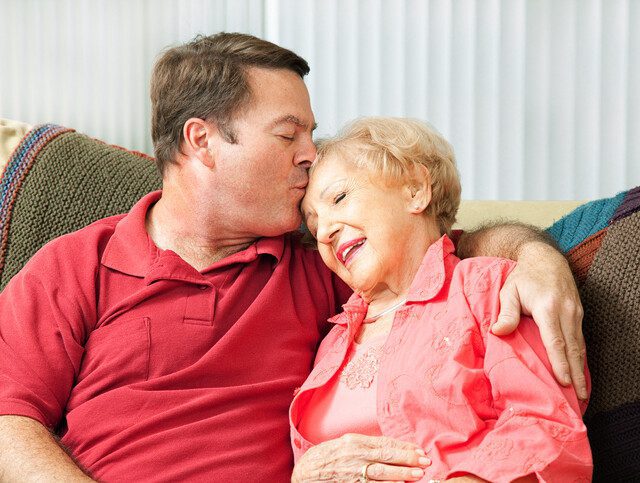Most people experience little bouts of forgetfulness as they get older, particularly when nearing age 70. Maybe you’re having trouble remembering a name or difficulty multitasking ” it can feel frustrating, but these are a completely normal part of aging. Small changes to your brain happen over time (and actually begin in your 20s). You probably didn’t notice anything then, but when these changes continue to compound and show themselves, it can feel unnerving.
And you may wonder how to tell if these things are normal…or signs of something more serious?
10 Signs & Symptoms of Alzheimer’s
More than 6 million Americans are currently living with Alzheimer’s, and it takes the lives of more people than breast cancer and prostate cancer combined. The Alzheimer’s Association recommends keying into these 10 early warning signs for Alzheimer’s disease. If you experience any of these yourself, or when interacting with a loved one, don’t wait on scheduling a doctor’s appointment to discuss symptoms.
- Memory loss disrupts daily life. When forgetfulness includes forgetting recently learned information, asking questions over and over or forgetting important dates, it could be an early sign of Alzheimer’s.
- Challenges planning or solving problems. Certain tasks ” like following a favorite recipe or working with numbers ” may become more difficult and take longer to complete.
- Difficulty completing familiar tasks. Remembering how to play a favorite game, driving to a regular location or completing other daily routine-based tasks gets harder.
- Confusion with time or place. Forgetting where you are ” or why you got there ” can be disorienting and frightening. Common symptoms also include losing track of the day, date and passage of time.
- Trouble with vision or spatial relationships. Vision issues arise for certain people, and this can cause problems with balance, judging distance between things and even determining color or contrast.
- New problems with words, speaking or writing. Sometimes, people suffering from Alzheimer’s have a hard time joining or following conversations, recalling the name for a common item or may continually repeat themselves.
- Misplacing things and unable to go back over their steps. Putting things in strange places, being unable to retrace steps and accusing others of stealing lost items may indicate Alzheimer’s.
- Decreased or poor judgment. Decisions and judgment surrounding money and personal grooming may diminish.
- Withdrawing from work or social activities. Any of the above symptoms may lead a person to keep more to themselves, avoiding favorite hobbies, pastimes or teams.
- Changes in mood or personality. Confusion, suspicion, depression, anxiety and fearfulness are all common personality changes.
Brain-Boosting Habits to Start Now
Certain risk factors of Alzheimer’s ” like genetics ” can’t be controlled. But you can influence lifestyle changes by adopting habits both big and small. By staying active and making healthy choices physically, mentally and socially, you may be able to maintain a healthy mind and body.
Physical Activities
It’s a recommendation we’ve heard again and again: Get active! But it’s true. Physical activity increases blood flow to your brain while helping to reduce risk factors like high blood pressure, high cholesterol and diabetes. Bonus points if you can make your physical activity into a social activity, too.
- Quit smoking! If you’re still smoking, kick the habit now. Smoking tops the list of major risk factors of cognitive decline. It impacts both the nervous and vascular systems, and effects on those can speed up memory loss.
- Get moving. Working movement into your day can make a big difference when it comes to keeping your blood pressure and cholesterol within the healthy range. Walking with a friend, gardening, golfing or even trying out a new dance class ” anything to safely elevate your heart rate (and that you’ll continue to do) is a good option.
- Consider updating your diet. Adopting a heart-healthy diet, which limits saturated fat, may help reduce dementia risk. The DASH and Mediterranean diets both focus on fruits, vegetables, whole grains, fish, poultry and nuts.
Mental Exercises
Your brain is like a muscle, so it needs to be exercised and rested, too. Stretch yourself by learning a new skill, attending a lecture or signing up for a new course. The more you work it, the stronger it gets.
- Try to stump yourself. Try a strategic game like bridge, complete a jigsaw puzzle, learn a new craft. Challenging your mind helps in both the short- and long-term.
- Get quality sleep. Conditions like insomnia or sleep apnea disrupt restorative sleep and may lead to memory issues.
- Reduce stress. Whether it’s through meditation, journaling, yoga, tai chi or other breathing exercises, reducing stress is good for your mind and heart.
Social Engagements
Staying socially connected offers a whole host of benefits, including a reduced rate of depression. Build connections by:
- Volunteer for a cause that matters to you. Feeling that you’re making a difference and have a greater purpose has been linked to reduced signs of dementia.
- Participate in a club. Whether it’s based on a hobby you love or an activity you enjoy, being part of a group with regular meetings can provide common ground with new friends.
- Visit with friends and family. Maintaining regular connections with your loved ones in person or virtually offers support, entertainment and love all in one.
How Friendship Village of Bloomington Supports Our Residents
By offering varying levels of care for our residents’ whole health journey, Friendship Village of Bloomington showcases an entire host of amenities and services to support brain health. From our independent living resident-led Dementia Friends interest group to fitness classes designed to support the body-brain connection, we have an entire community supporting those suffering from memory loss.
memory care and assisted living residences to better support and engage our residents. Not to mention, our on-site restaurants make it easy to eat healthy without even thinking about it!
Want to learn more about the levels of care offered here at Friendship Village of Bloomington? Contact us today ” we’d love to talk with you about life in our neck of the woods.


